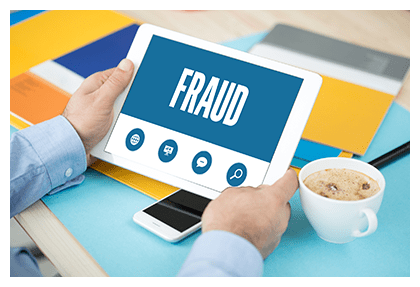CHECK FRAUD – CALIFORNIA PC 476

If you have been accused of committing the crime of check fraud in Los Angeles or Southern California, you cannot afford to go to court without the best possible legal representation. The penalties for many forms of fraud, including check fraud, can be quite severe, and the risks are, therefore, simply too high to rely on anyone but a defense attorney with longtime experience and success in this specific practice area.
At the Criminal Law Office of Leah Legal, we have been representing and getting great results for check fraud defense clients for years. We understand what it takes to build a solid defense against these charges and how to anticipate and counter the moves of the prosecuting attorney. We stand ready to assist you 24/7. Simply call us at 818-484-1100 any time that is convenient for you for a free legal consultation and immediate attention to your case.
Free Consultation 818-484-1100
How Does California Define "Check Fraud?"
Under California Penal Code section 476, check fraud is defined as creating, possessing, or using a check with the intent to defraud another person or entity and to benefit financially from the transaction yourself. The intent, however, to defraud must be accompanied by an actual presentation of the check as being valid before check fraud has been committed.
There are a number of different ways to commit check fraud, including forging a signature onto the check, adjusting the dollar value of the check, or manufacturing a completely fake check and attempting to fill it out and use it. All check fraud, however, is considered not only a fraud crime but also a forgery crime, under California law.
What Must the Prosecutor Prove?
To gain a conviction on the charge of check fraud, the prosecution must prove beyond all doubt the following "elements of the crime:"
- The defendant knowingly possessed, altered, or made OR attempted to alter or make a check that would not be valid to pass.
- The defendant had an intention to pass said invalid check as if it were genuine.
- The defendant intended to defraud another by passing the check and to benefit financially from the transaction.
- The defendant presented the fraudulent check and represented it as genuine.
It is not sufficient that even all of these elements but one be true to gain a conviction. Unless you are proven to be guilty on all four elements, you cannot be convicted as guilty at all.
Intent to Defraud - It is key to remember, however, that you need not have actually succeeded at defrauding another person to be convicted of check fraud. So long as you possessed a fraud check, intended to use it, and presented it with intent of passing it off as genuine, that is check fraud.
Represent as Genuine - But how does one present a check as genuine? This can be done in words, in writing, by actions, in person, via mail, and in may ways, but basically, any time you attempt to use a fraudulent checking, knowing that it is fraudulent, that amounts to presenting as genuine what in fact is not.
Types of Check Fraud
There are a number of different types of check fraud that are specifically criminalized in California Penal Code section 476. Below, we look at two particular forms of check fraud in a little more detail:
- Passing Fictitious Checks
A fictitious check is not one that doesn't exist but one for which a bank, bank account, or signer does not exist. It is simply legalese for a fake check.
Such checks are sometimes created on private computers or manufacturing machines. The perpetrator of the fictitious check then attempts to pass the forged check off as genuine, either by cashing it, depositing it, or paying for goods/services with it.
This crime is distinguished from attempting to pass a check for an account that has been closed or that does not have sufficient funds. While those would also be illegal actions, they would not count as passing fictitious checks.
- Altering Checks
Check fraud can also be committed by altering an existing check by adding information to it, deleting information, or changing it in some way. The alterations must be such that the physical check appears different than in its original state, and the changes made must be such that they would change the legal status or monetary value of the check.
For example, adding an extra zero to change $10 to $100, adjusting the date on a post-dated check, or changing the routing/bank account number on the check would all constitute check fraud by alteration.
Possible Penalties for California Check Fraud

As mentioned above, check fraud under Penal Code section 476 is considered to be a forgery crime in the state of California. It is, therefore, generally punished as are other forgery crimes.
Check fraud is a wobbler crime and can be either a felony or a misdemeanor, depending on the circumstances of the case and on the defendant's past criminal record.
If the amount of money the forged check was written out for was $950 or less, a check fraud charge will be a misdemeanor, while a fake check written out for over $950 would make it a felony.
However, there is an exception imposed by Prop 47, which was passed by California voters in 2014: if the defendant is convicted of both check fraud and identity theft, under California Penal Code section 530.5, it will be a felony regardless of the dollar amount on the check.
And there is a second exception as well: regardless of the amount of the fraud check, if the defendant has a violent felony or sex crime on his/her record, the charge can be either a felony or misdemeanor, a wobbler charge.
When charged as a misdemeanor, check fraud in California is punishable by:
- Up to 12 months in county jail.
- Up to a $1,000 fine.
When charged as a felony, California check fraud is punishable by:
- 16 months to 3 years in jail OR probation and 12 months in jail.
- A fine of up to $10,000.
Possible Defense Strategies
At Leah Legal Criminal Defense, we have been defending clients in Los Angeles and throughout Southern California against charges of check fraud for years. We have seen cases involving every type of check fraud imaginable and know well how to build a solid defense for each particular scenario.
Some of the most common defenses we use in these types of cases include:
- Lack of Fraudulent Intent: With any form of fraud in California, including check fraud, you cannot be convicted unless it can be shown you had an intent to defraud another person or entity. Thus, someone could (hypothetically, for there would be little reason to do so) make a check out to himself for $100,000 but have no intention of trying to use it. That would not be check fraud. A more likely scenario would be if someone else paid you with a fake check, and then you went to deposit it in your bank account or cash it. You could be arrested and charged with check fraud, but if you did not know and had not reason to believe the check was fake, you would not be guilty.
- Possession of Consent: In another scenario, you might have indeed made changes to a check. Perhaps, you adjusted the dollar amount or even signed in the payee's name. However, it the payee or whoever had authority to permit you to do so, allowed you to make the change for some reason, then it would not be check fraud. People give permission to make these kinds of changes all the time; and while not necessarily 100% protocol, it is certainly not check fraud.
- Mistaken Identity or False Accusations: Another possible defense is that, as those committing check fraud seek to remain hidden, you were the victim of circumstantial evidence or even of a "frame job." It could also be that someone accused you of check fraud on purpose, knowing you were innocent, out of a spirit of revenge, having some sort of grudge against you. A good lawyer will know how to get to the bottom of these kinds of situations. There will normally be evidence and witnesses available to help your case, and as the opposition's case can only be founded on circumstantial evidence, a good defense lawyer will know how to challenge and undermine that evidence.
Other Related Offenses
There are other offenses similar to check fraud that often come up in check fraud cases, either as being charged alongside a check fraud charge or in place of one. Some of the most common related offenses include:
- Writing Bad Checks (PC 476a): When you write out or pass a check, while aware of the fact that you do not have sufficient funds in your account to cover the amount it is written out for, and with intent to defraud another party, it is a crime under California Penal Code section 476a. Sometimes, you can be charged with both check fraud and writing bad checks, or you might get a charge reduction from PC 476 to 476a in a favorable plea deal. Writing bad checks is a misdemeanor if the amount involved is $950 or less, otherwise, it is a "wobbler." And you can also be sued for the amount of the bad check, and pay extra damages that can be as high as $1,500.
- Forgery (PC 470): Forgery is a very broad category in the California Penal Code, while check fraud is a very specific kind of forgery crime. If forgery involves checks and other payable notes, it is classed as check fraud. Normally, you will be charged under Penal Code section 476 for check fraud, but sometimes, the prosecutor may choose to charge you under Penal Code section 470 instead of or in addition to the PC 476 charge. However, he can only do this if your forged a signature or a document, and you cannot be convicted on both PC 470 and 476 for the same offense.
- Grand Theft (PC 487): Any time you take property belonging to another person without the owner's consent and with intent to deprive the owner of that property, it is theft under California law. In general, if the value of the property or money you stole was over $950, it is grand theft. Thus, one can be charged with both grand theft and check fraud when he or she succeeds at defrauding someone of over $950. Grand theft can be charged as a felony or misdemeanor, but when the amount stolen is over $65,000, it will always be a felony and incur incarceration time beyond that of even an ordinary grand theft felony. As a misdemeanor, grand theft is punishable by up to one year in jail. As a felony, it is normally punished by 16 months to 3 years in county jail or state prison.
- Petty Theft (PC 488): In California, the unlawful taking of the property of another valued at or below $950 is considered a petty theft. Petty theft is a misdemeanor, punishable by 6 months in county jail and a fine of up to $10,0000. It is possible to be charged with both check fraud and petty theft for the same offense.
Contact Us Today For Help
At Leah Legal, we have a proven track record of success in defending against check fraud charges in Los Angeles and the Southern California area. Our detailed knowledge of the law, our longtime familiarity with local court processes, and our personal knowledge of many judges and prosecutors in the region uniquely fit us to win your case.
Call our Los Angeles Criminal Lawyer today, or anytime 24/7/365, for a free consultation, at 818-484-1100.


